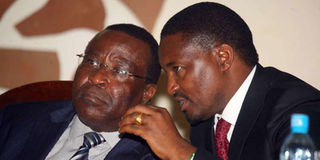51 model laws for counties introduced

Devolution Cabinet Secretary Mwangi Kiunjuri (right) and Senate Speaker Ekwee Ethuro at the launch of County Model Laws at the Kenya School of Government in Nairobi on November 15, 2016. PHOTO | NATION MEDIA GROUP
What you need to know:
- This follows increasing concern that most of the Bills being churned out of the county assemblies are below standard, ambiguous, unconstitutional, or in direct conflict with national laws.
- The model laws cover all functions of the counties under the Fourth Schedule of the Constitution, including health, agriculture, county tourism, planning, development, trade, animal control, pollution, water provision and sanitation, among others.
- Last year, Nyamira Governor John Nyagarama famously rejected three of seven Bills that were presented to him, blaming unconstitutionality and typographical and grammatical errors.
The national government has launched 51 model laws covering the 14 functions of the county governments to help the devolved units draft better laws.
This follows increasing concern that most of the Bills being churned out of the county assemblies are below standard, ambiguous, unconstitutional, or in direct conflict with national laws.
Devolution Cabinet Secretary Mwangi Kiunjuri on Tuesday said that the new model laws will be “valuable points of reference for county lawmakers”.
“The model laws have covered every area of devolution. It is now about cut and paste. From today henceforth, every assembly can now make very good laws,” Mr Kiunjuri said after he launched the model laws at the Kenya School of Government in Lower Kabete.
So far, the 47 counties have passed 1,927 Bills, an average of 41 Acts per assembly, a feat the County Assemblies Forum yesterday described as impressive despite the immense challenges.
The model laws cover all functions of the counties under the Fourth Schedule of the Constitution, including health, agriculture, county tourism, planning, development, trade, animal control, pollution, water provision and sanitation, among others.
Last year, Nyamira Governor John Nyagarama famously rejected three of seven Bills that were presented to him, blaming unconstitutionality and typographical and grammatical errors.
The CS was accompanied by Senate Speaker Ekwee Ethuro, Devolution Principal Secretary Mwanamaka Mabruki, Kenya Law Reform Commission chair Mbage Ng’ang’a, members of the county assemblies and representatives from various arms of government.
Mr Ethuro said that the journey to getting each of the 47 assemblies to make constitutional laws had started with the model legislations.
“For four years, we have worked hard to ensure that the laws out of our Assemblies are constitutional and progressive,” said Mr Ethuro.
“The model laws are generically developed to ensure that the county legislations are development conscious, of very high standards, and are in conformity with the Constitution,” said Mr Ng’ang’a.
County Assemblies Forum acting chair Johnson Osoi said: “With this new model laws today, drafting and implementation of county legislation will be a lot easier.”
County Attorneys Forum chairman Sylvester Metto said that the model laws will reduce the many cases of litigation between county and national government, a claim Mr Ethuro backed.
“We want to see more consultation and alternative dispute resolutions. Let us see as little litigation as possible,” Mr Ethuro said.





